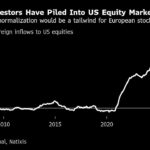
Inflation and higher costs of living are preventing many workers from saving more for retirement, with roughly 3 out of 4 working adults contributing the same, less or nothing to their retirement in the past year, a new report found.
According to a new report from Bankrate.com released Monday, just 25% of workers have increased their retirement contributions this year compared to last year, and 16% are contributing less. Roughly 1 in 3 (34%) are contributing the same amount, while a troubling 24% weren’t contributing to retirement savings last year and are not contributing this year, either.
The reason cited most often for the curtailed retirement savings? Inflation.
Read: Another casualty of inflation: People are saving less for retirement
“Inflation is very clearly the No. 1 obstacle for those who aren’t saving more for retirement—and by more than a 2-to-1 margin over any other single response,” said Greg McBride, chief financial analyst for Bankrate. “It has been well-chronicled that inflation has outpaced the growth in average hourly earnings and squeezed household budgets, and a limited capacity to increase retirement savings is a byproduct of that.”
The yearly rate of inflation slipped to 8.2% from 8.3%. Inflation peaked at a nearly 41-year high of 9.1% in June. The cost of groceries has surged, rent has increased and medical care has risen. Prices also rose last month for education, new cars, home furnishings and auto insurance.
Read: Consumer prices jump again and CPI shows little relief from high inflation
Other reasons cited for retirement-savings troubles included stagnant or reduced income (24%), new expenses (24%), debt repayment (23%), a desire to keep more cash on hand (22%), market volatility (18%) and some other reasons (5%). An additional 7% say they don’t need or want to contribute more, Bankrate said. Respondents could select more than one response.
The majority of working Americans (55%) feel they are behind on retirement savings, including over a third (35%) who feel “significantly behind” and 1 in 5 (20%) who feel “slightly behind,” according to Bankrate.
Read: More seniors are being pushed into poverty — here’s why
While most workers feel like they are behind on retirement savings, only 20% say they are right on track, and just 15% think they are ahead of where they should be. This includes 8% who feel “slightly ahead” and 7% who feel “significantly ahead.”
Among those that feel behind on retirement savings, just 18% are contributing more this year while over 1 in 5 (21%) are contributing less. Despite feeling behind on retirement savings, 30% of this group haven’t changed contribution amounts year-over-year, and 31% weren’t contributing anything last year or this year.
“American are undersaved for emergencies and undersaved for retirement,” McBride said. “Americans weren’t great savers before inflation hit and now it’s worse. Americans’ poor savings habits are as traditional as baseball and apple pie.”
Those most likely to be contributing more to their retirement this year are workers that are already on track or ahead of where they should be (42%), which outnumber those contributing less (10%) by more than 4-to-1. A total of 42% of this group have kept contributions the same, and just 6% haven’t made any contributions over the last two years.
“More than one third of workers feel they are ‘significantly behind’ on their retirement savings, and those that already feel behind are twice as likely to be contributing less this year than workers that feel they’re on track or ahead of where they should be,” McBride said.
Gen Z workers (ages 18-25) are the only generation to be evenly split between feeling ahead (31%) or behind (30%) on retirement savings, Bankrate found.
Every other generation, though, is overwhelmingly more likely to say they are behind, and that likelihood increases with age. Among millennials (ages 26-41), 46% claim to be behind, while just 19% are ahead.
“Millennials and Gen Z have much more disciplined savings habits. Coming of age in the great financial crisis really shaped their perception on savings,” McBride said.
For Gen Xers (ages 42-57), 65% are behind, and 9% ahead. Among baby boomers (ages 58-76), 71% feel they are behind on retirement savings, and just 7% feel they are ahead of where they should be.
“For baby boomers, they have less time in the game to save and less benefit of compounding. They can contribute more, scale back their retirement aspirations or work longer,” McBride said.
Additionally, younger workers are more likely to have increased rather than decreased their retirement savings contributions compared to last year, with 30% of Gen Zers and millennials having increased their contributions and just 10% of Gen Zers and 18% of millennials having decreased their contributions. The difference is much less among Gen Xers (19% increasing, 17% decreasing) and baby boomers (22% increasing, 18% decreasing).
Among income groups, households earning $100,000 or more are the only ones that have less than half saying they are behind on retirement savings, but those that are behind (46%) still outnumber those that are ahead (23%) by a 2-to-1 margin. The margin is greater for those earning $80,000-$99,999 annually (54% behind to 17% ahead), and it is greater still for households earning less than $80,000 annually (59% behind to just 13% ahead).
“The top financial regret we hear is ‘I didn’t start saving for retirement earlier,’” McBride said.






